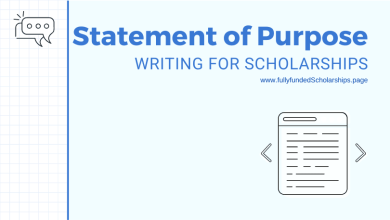
To get a scholarship at a good college or university, you must have written a “study plan” document. Writing a plan of study can be difficult as it requires many steps, careful planning of the academic schedule, and attention to detail. For most scholarship opportunities, a study plan is needed. Thus, it must describe the applicant’s educational goals, organized study times, and plans to reach those goals. A well-written plan of study can convince the scholarship committee that the applicant is a strong candidate and has the motivation to succeed in their studies.
Definition of Study Plan:
A study plan is a detailed outline of the academic and personal goals you plan to achieve as a scholarship recipient. It includes the courses you’ll take, the resources you’ll need, and any extracurricular activities you’ll participate in.
The purpose of a study plan is to demonstrate your motivation and commitment to your studies. It also depicts how you’ll use the scholarship funding to accomplish your goals. It’s an essential part of a scholarship application because it shows the scholarship committee your dedication to your studies and your plan for success.
How to Write a Strong Plan Of Study?
To write a study plan for a scholarship application, you must outline your academic and personal goals and how you plan to achieve them. Here are some steps to write a strong plan of study:
- Introduce yourself and provide information about your academic background and your last degree.
- Next, provide details about your academic accomplishments and any relevant experiences you have had.
- Write about your beliefs and attitudes towards the culture of the country where you will study.
- Explain your reasons for wanting to study in this particular country. Also, describe how you believe it will benefit your academic and personal development.
- Clearly outline your learning objectives and the specific goals you hope to achieve as a scholarship recipient.
- Prepare a plan for how you will achieve these goals. Include the courses you will take, the resources you need, and any extracurricular activities you will participate in.
- Lastly, highlight your skills and summarize your motivations and commitment to your studies in the conclusion.
Remember to tailor your study plan to the specific values of the scholarship organization. Having someone else review your study plan for feedback and check for errors is also a good idea.
Format of Study Plan Document:
Here is a possible format you can follow while writing a study plan:
- Introduction: A brief overview of your background and why you have applied for the scholarship.
- Goals: A list of your academic and personal goals, including any specific milestones you hope to achieve.
- Courses: A description of the courses you will take and how they fit into your academic and career goals.
- Resources: A list of the resources and assistance you will need to accomplish your goals. Such as course materials, textbooks, software, tutoring, or mentorship.
- Extracurricular activities: A description of any extracurricular activities you will participate in, such as volunteering, internships, or research projects.
- Funding: A plan for how you will use the scholarship funding to support your academic and personal development.
- Conclusion: A summary of your motivation and commitment to your studies and how the scholarship will help you achieve your goals
By including these components in your study plan, you can demonstrate your dedication to studies and your ability to excel in your chosen field to the scholarship committee.
Let’s Start Writing a Spotless Study Plan!
Here are some final tips for creating a solid study plan for a scholarship application:
- Start early and provide yourself plenty of time to plan and write your study plan.
- Set specific, measurable goals using the SMART (specific, measurable, achievable, relevant, & time-bound) criteria.
- Be truthful and realistic about your strengths and limitations.
- Make sure your study plan fits the organization’s values and top priorities.
- Use clear, concise language and avoid slang.
- Get a second opinion and catch any mistakes in your study plan by showing it to someone else.
You can create a well-written study plan using these tips & it will increase your chances of receiving a scholarship.










